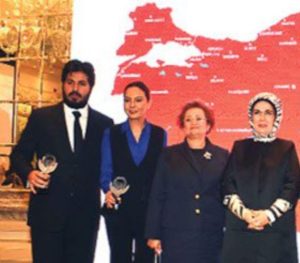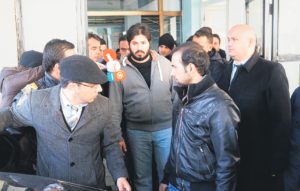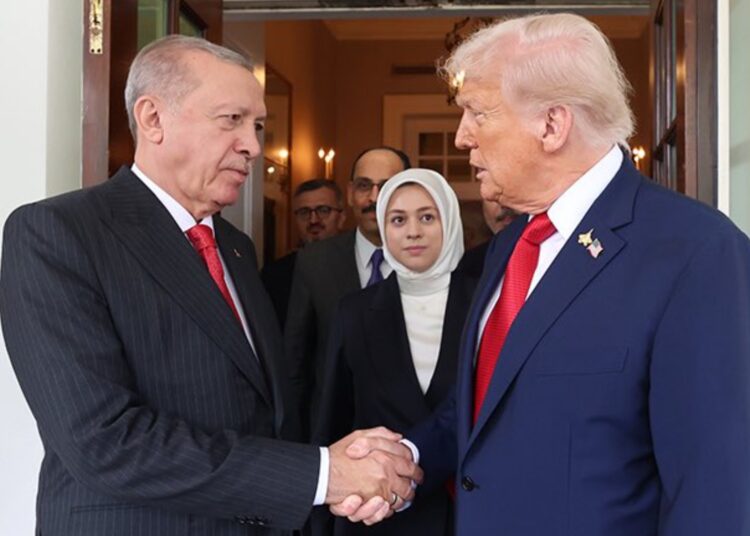Abdullah Bozkurt/Stockholm
The nightmare scenario behind Turkish President Recep Tayyip Erdogan’s long-running fear that he could one day be drawn into a US federal criminal case involving billions of dollars in money laundering on behalf of Iran surfaced publicly when he abruptly raised the ongoing prosecution of Türkiye Halk Bankası A.Ş. (Halkbank) during a joint press event at the White House on September 25, 2025.
“I believe we will have the opportunity today to discuss in detail the matter of our relations concerning Halkbank,” Erdogan told reporters while standing beside President Donald Trump, who notably declined to comment on the issue. On his flight back to Turkey aboard the presidential aircraft, Erdogan went further, claiming that Trump had personally assured him that the Halkbank case was resolved.
“Mr. Trump said both during our contacts in the United States and in our most recent phone conversation, ‘The Halkbank issue is over for us.’ Of course, this is an important declaration of political will, and it is valuable for us as well. On the other hand, we also know that there are certain processes that still need to be completed. Our wish is that these processes will be concluded positively as soon as possible,” Erdogan told accompanying journalists.
Barely 10 days later, the US Supreme Court rejected Halkbank’s last-ditch appeal. The ruling, recorded in the court’s docket on October 6, 2025, ended the Turkish state lender’s years-long effort to escape criminal prosecution, closing one of the most consequential legal confrontations between Washington and Ankara in decades. The bank’s petition had sought immunity as an arm of the Turkish state. By declining to hear the case, the justices left standing a Second Circuit Court of Appeals decision allowing the US Department of Justice (DOJ) to proceed with criminal charges.
At the heart of the dispute lies an allegation that Halkbank played a central role in an elaborate financial network designed to help Iran evade US sanctions, channeling billions of dollars in oil and gas revenue into gold and cash transactions disguised as trade. Federal prosecutors in New York say the scheme operated from 2011 to 2016 and involved senior Turkish officials, businessmen and intermediaries close to then-prime minister Erdogan. They accuse Halkbank executives of conspiring to launder Iranian funds through front companies and falsified documents to disguise illegal payments.

Acting under covert directives from Erdogan-aligned government officials, Halkbank allegedly relied on gold exports, fictitious trade and fraudulent humanitarian shipments to move billions through the global banking system including US financial networks, thus granting Iran access to restricted revenue from its oil and gas sales deposited in Turkish accounts.
US regulators had repeatedly warned Halkbank about irregular transactions. Rather than correct them, bank executives responded with deception and concealment efforts, deepening US suspicions of deliberate sanctions evasion. The laundering operation first surfaced publicly in December 2013, when Turkish prosecutors Celal Kara and Zekeriya Öz filed an indictment following a three-year corruption probe into an organized crime network. Their findings exposed how Halkbank managers and senior government officials had accepted multimillion-dollar bribes to facilitate Iranian access to Turkey’s financial system and to shield the transactions from regulatory scrutiny.
The 2013 indictment charged 53 individuals, including three cabinet members — Interior Minister Muammer Güler, EU Minister Egemen Bağış and Economy Minister Zafer Çağlayan — with bribery and abuse of power for laundering Iranian funds on behalf of Reza Zarrab, an Iranian-Turkish gold trader and key figure in the scheme. Erdogan, then prime minister, denounced the graft probe as a “coup attempt” and retaliated by purging police chiefs, prosecutors and judges involved in the investigation. He ordered all charges dismissed, ensuring political protection for his allies. After his release, Zarrab resumed his money-laundering activities, apparently with Erdogan’s approval and backing.
In 2016 US authorities arrested Zarrab in Miami while he was vacationing in the United States. He was later charged with multiple counts of sanctions violations, bank fraud and money laundering. In September 2017 the DOJ indicted Zarrab, former Turkish minister Zafer Çağlayan and several others for “conspiring to use the US financial system to facilitate hundreds of millions of dollars’ worth of transactions on behalf of the Government of Iran and other Iranian entities.” Zarrab eventually turned government witness, testifying in detail about how the scheme functioned and revealing that numerous Turkish ministers were on his payroll. His testimony directly implicated senior officials in Erdogan’s cabinet.
At the end of the 2018 trial, Mehmet Hakan Atilla, Halkbank’s deputy general manager, was convicted and sentenced to prison in the United States before returning to Turkey in July 2019. The other indicted co-conspirators, including Çağlayan, remain at large and uncharged in Turkey. Zarrab’s testimony alleged that Erdogan personally ordered Turkish state banks to join the sanctions-busting operation in return for kickbacks. Documentary evidence presented during Atilla’s trial referred to a mysterious figure nicknamed “Abi” (elder brother), believed to be Erdogan himself, who allegedly benefited from the scheme by receiving a share of the illicit proceeds. These disclosures underscored the depth of the corruption and the potential exposure of Turkey’s top leadership.

Erdogan has spent nearly a decade trying to derail the Halkbank investigation through political and diplomatic channels. He personally lobbied three successive US presidents — Barack Obama, Donald Trump and Joe Biden — urging them to intervene in the federal case. During this period Turkish authorities detained multiple US nationals and local consular employees in Istanbul and Adana, apparently using them as leverage to secure concessions over the Halkbank proceedings. These pressure tactics failed to produce any result.
In 2019 US prosecutors escalated the matter by indicting Halkbank itself as an institution, charging it with conspiracy to defraud the United States, bank fraud, money laundering and violations of the International Emergency Economic Powers Act (IEEPA) for facilitating prohibited Iranian transactions. Halkbank’s defense hinged on the claim that it was immune from prosecution as an instrumentality of the Turkish state. Its lawyers argued that the charges represented an unacceptable intrusion into a foreign government’s sovereign affairs and that all actions were undertaken under Turkey’s official authority.
The DOJ countered that Halkbank’s activities were commercial, not sovereign, and therefore not protected by immunity. Prosecutors maintained that the bank had acted as a market participant laundering funds for profit, not as an organ of state policy. After years of litigation, the Second Circuit Court of Appeals ruled in 2024 that Halkbank could not hide behind sovereign immunity for its commercial conduct, even if politically encouraged by Ankara. The decision reaffirmed that sovereign status does not shield criminal activity. The Supreme Court’s decision on October 6, 2025, to decline review effectively validated that conclusion and cleared the way for US prosecutors to move forward with the case.

Behind closed doors, US officials have voiced frustration that Ankara tried to use political influence including direct appeals from Erdogan to halt what was fundamentally a criminal matter. Turkish officials, meanwhile, have accused Washington of politicizing the judiciary and using the case as leverage to influence Ankara’s foreign policy. Erdogan repeatedly framed Halkbank as a victim of Western bias.
During his 2019 White House visit he insisted, “Halkbank is not a criminal institution; it is the pride of the Turkish nation. We explained to President Trump that this matter is political, not judicial, and should be resolved through diplomacy, not the courts.” His lobbying failed to sway the American legal system. US courts maintained that the independence of the judiciary precluded political interference, even from the executive branch.
The Supreme Court’s rejection of Halkbank’s appeal is both a legal and reputational setback for Turkey. The bank now faces trial in New York and potential penalties that could reach billions of dollars. More significantly, as proceedings advance, evidence could further implicate President Erdogan and members of his family in the sanctions-busting operation, a scenario that Ankara has desperately sought to avoid.
Rumors have circulated in diplomatic circles that Turkey offered to pay a $100 million settlement to have the case dropped altogether. Whether the US judiciary will tolerate any such political bargaining remains unclear.
The next phase will also reveal whether Erdogan secured personal assurances from Trump to quash the case and whether the Justice Department will withstand potential political pressure from the White House. At stake is not only Turkey’s reputation but also the deterrent authority of US sanctions law — the principle that individuals and corporations cannot invoke sovereignty to shield criminal violations of US financial regulations.
The way the case proceeds will determine whether the United States can maintain that standard and whether President Erdogan can once again defy accountability for a scandal that has haunted his presidency for more than a decade.












